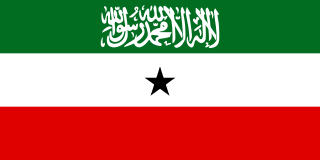
Somaliland, officially the Republic of Somaliland, is an unrecognised state in the Horn of Africa, recognised internationally as de jure part of Somalia. It is located in the southern coast of the Gulf of Aden and bordered by Djibouti to the northwest, Ethiopia to the south and west, and Somalia to the east. Its claimed territory has an area of 176,120 square kilometres (68,000 sq mi), with approximately 5.7 million residents as of 2021. The capital and largest city is Hargeisa. The Government of Somaliland regards itself as the successor state to British Somaliland, which, as the briefly independent State of Somaliland, united from 1960 to 1991 with the Trust Territory of Somaliland to form the Somali Republic.
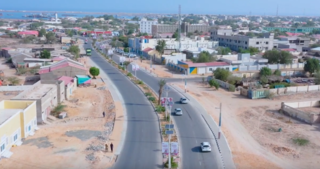
Berbera is the capital of the Sahil region of Somaliland and is the main sea port of the country, located approximately 160 km from the national capital, Hargeisa. Berbera is a coastal city and was the former capital of the British Somaliland protectorate before Hargeisa. It also served as a major port of the Ifat, Adal and Isaaq sultanates from the 13th to 19th centuries.

Foreign relations of the Republic of Somaliland are the responsibility of the Ministry of Foreign Affairs of the Republic of Somaliland. The region's self-declaration of independence remains unrecognised by the international community.

The Economy of Somaliland largely relies on primary production and agriculture, where livestock is the main export of the country, which it ships to neighbouring Djibouti and Ethiopia, as well as to Gulf states, such as UAE, Saudi Arabia and Oman. Somaliland has a GDP per capita of $852 and a gross domestic product GDP of $3,782,000,000 as of 2022, most of which it receives in remittances from Somalis working abroad. The COVID-19 pandemic has restricted Somaliland's trade flows with decreased demand in the agriculture sector, a significant source of tax revenue.

The Somaliland National Armed Forces are the military services of the Republic of Somaliland. The Somaliland National Armed Forces consist of the Somaliland National Army, the Somaliland Coast Guard, the Somaliland Police Force, the Somaliland Custodial Corps, the Somaliland Immigration and Border Control and the Somaliland Fire Brigade. There is no air force. The Armed Forces is under the command of President Muse Bihi Abdi, who is the Commander-in-chief. Minister of Defence Abdiqani Mohamoud Aateye is the designated minister that oversees the armed forces.

Berbera International Airport (Somali: Madaarka Caalamiga ah ee Berbera) is an airport in Berbera, a city in the northwestern Sahil province in Somaliland. The airport was renovated and opened to international passengers on 20 November 2021.

Tog Wajaale is a city on the border of Somaliland and Ethiopia. Tog Wajaale is the main border crossing for goods coming in and out of Somaliland, primarily from the port city of Berbera, Somaliland's main port.
Piracy off the coast of Somalia occurs in the Gulf of Aden, Guardafui Channel, and Somali Sea, in Somali territorial waters and other surrounding places and has a long and troubled history with different perspectives from different communities. It was initially a threat to international fishing vessels during the early 2000s, only to rapidly escalate and expand to international shipping during the War in Somalia (2006–2009).

The Somali Navy is the naval warfare service branch of the Somali Armed Forces. It is now virtually inactive.
Matthew Bryden is a Canadian political analyst active in the Horn of Africa. He worked for several aid and political organizations in Somalia after spending some time in the region during his leave from the Canadian military in 1987. He served as the Coordinator for the Monitoring Group Eritrea (EMG) from 2008-2012. He is now a strategic security consultant at Sahan Research, a think tank based in Nairobi.
In keeping with the Paris Principles definition of a child soldier, the Roméo Dallaire Child Soldiers Initiative defines a child pirate as any person below 18 years of age who is or who has been recruited or used by a pirate gang in any capacity, including children – boys and/or girls – used as gunmen in boarding parties, hostage guards, negotiators, ship captains, messengers, spies or for sexual purposes, whether at sea or on land. It does not only refer to a child who is taking or has taken a direct part in kinetic criminal operations.
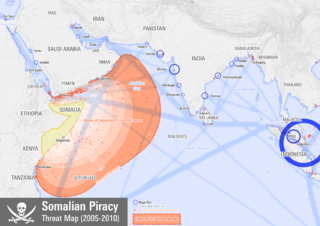
Piracy in Somalia has been a threat to international shipping since the beginning of the country's civil war in the early 1990s. Since 2005, many international organizations have expressed concern over the rise in acts of piracy. Piracy impeded the delivery of shipments and increased shipping expenses, costing an estimated $6.6 to $6.9 billion a year in global trade in 2011 according to Oceans Beyond Piracy (OBP).
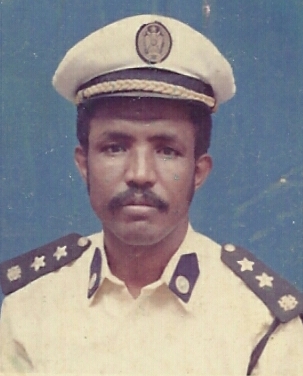
Eng. Mohamed Isse Ali, also known as Col. Mohamed Isse Ganaje, is a Somali engineer, Navy commander, and politician. Lacle has extensive experience in naval warfare, electricity and mechanics, politics and diplomacy. He has taught subjects in naval warfare and engineering in the Technical Maritime Intermediate School of the National Somali Navy and served as director from 1981 to 1982. He served in the Somali Navy from 1975 to 1991 and held several commanding positions at his time before the Somali Civil War broke. He holds the rank of naval captain. He currently resides in Garoe, the capital of Puntland.
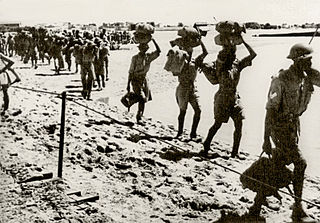
Operation Appearance was a British landing in the British Somaliland Protectorate against troops of the Italian Army. The Italian conquest of British Somaliland had taken place seven months previously, in August 1940. The British had withdrawn from the protectorate after a delaying action at the Battle of Tug Argan. This withdrawal, after the disastrous conclusion of the Battle of France and the Italian declaration of war on 10 June 1940, had repercussions among British leaders. It led Prime Minister Winston Churchill to lose confidence in General Archibald Wavell, the British commander in the Middle East, which culminated in Wavell's sacking on 20 June 1941.
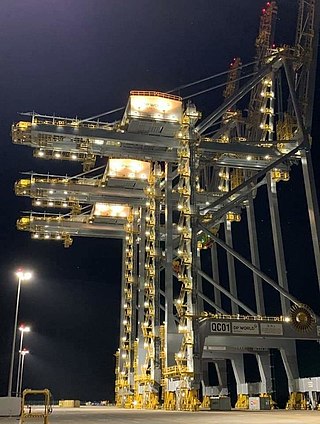
Sahil is an administrative region (gobol) in northern Somaliland with the port city of Berbera as its capital. It was separated from Woqooyi Galbeed and became a province in 1991. In 1998, the Sheikh District of Togdheer was incorporated into Sahil region. The region has a long coastline facing the Gulf of Aden to the north. Sahil borders Awdal to the northwest, Maroodi Jeex to the southwest, Togdheer to the south and Sanaag to the east.

The Ministry of Justice of the Republic Somaliland administers the court system and has the authority to hire court personnel, allocate funds, and train, discipline or dismiss judicial officers. According to Articles 7 and 38 of the Organisation of the Judiciary Law, the ministry even compiles a panel of assessors on an annual basis for the regional courts. Additionally, the ministry is a member of the Judicial Commission. The current minister is Mustafe Mohamoud Ali

The Isaaq Sultanate was a Somali kingdom that ruled parts of the Horn of Africa during the 18th and 19th centuries. It spanned the territories of the Isaaq clan in modern-day Somaliland and Ethiopia. The sultanate was governed by the Rer Guled branch of the Garhajis clan and is the pre-colonial predecessor to the modern Republic of Somaliland.
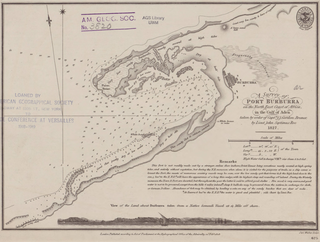
The Battle of Berbera was an engagement of the Royal Navy and East India Company against the Habr Awal clan. It was the culmination of previous British punitive expeditions against the Habr Awal.

The Somaliland War of Independence was a rebellion waged by the Somali National Movement (SNM) against the ruling military junta in Somalia led by General Siad Barre lasting from its founding on 6 April 1981 and ended on 18 May 1991 when the SNM declared what was then northern Somalia independent as the Republic of Somaliland. The conflict served as the main theater of the larger Somali Rebellion that started in 1978. The conflict was in response to the harsh policies enacted by the Barre regime against the main clan family in Somaliland, the Isaaq, including a declaration of economic warfare on the clan-family. These harsh policies were put into effect shortly after the conclusion of the disastrous Ogaden War in 1978.
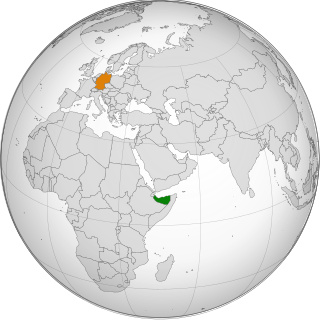
Germany and Somaliland do not have formal diplomatic relations but have maintained informal contact. Germany recognizes the region of Somaliland as part of Somalia.















